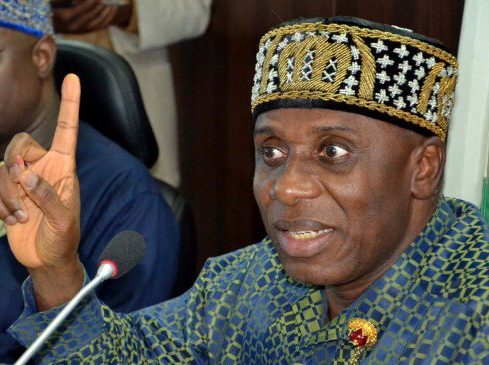
The Minister of Transportation, Rotimi Amaechi, has said that the Federal Government would not reverse its decision to suspend the controversial secure anchorage area (SAA) in the Lagos Pilotage District.
The SAA is an area with a private company, has defined as a secure place where vessels can anchor safely from the threat of pirate attack.
Speaking at a press conference in Lagos on Monday, Amaechi said that the operation of the SAA was suspended because it is illegal to create anchorage for purposes of providing security.
The SAA is an area outside the Lagos port that the Nigerian Navy, with a private company, OMSL, has defined as a secure place where vessels can anchor safely from the threat of pirate attack.
The Nigerian Ports Authority (NPA) dismantled the SAA in 2019.
Amaechi said: “I took the decision to stop the secure Anchorage project, because the issue is that an individual cannot protect a country; it shows that there is a failure in the system. Government must protect both persons and investment to ensure orderliness.”
The minister said that government was reintroducing a maritime architecture that would ensure that infrastructure was in place to safeguard the country’s waterways.
He said that the upsurge of threats and insecurity on the waterways was alarming and people doing business on the waters were getting worried, hence the need to reassure them that all was well.
Amaechi noted that NIMASA was on top of the situation.
He said that government was paying a huge amount of money for survelliance, and this would ensure that crime on the waterways stop.
“Those that go into the water do not live in the water; those criminals live with us, and the military both in terms of intelligence and physical assets will go and comb them out.
“Problem of insecurity is a problem of hunger, education and poverty and so we need to invest in infrastructure which will create employment for the poor man,” the added.
The Director-General of NIMASA, Dakuku Peterside, said that the country was not handing over its waterways to the Israeli to man.
According to him, they are there to provide training and assets for the security operatives who will man the assets on the country’s waterways.
“Let me first correct this impression; the country was not handing over its waterways for the Israeli to man, but for them to give their services in terms of training,” he said.
Peterside noted that 80 percent of the assets for ensuring security of the waterways would be in the country by June and would be manned by the security operatives trained.
He listed some of the assets to include six interceptor boats, six armoured vehicles, helicopter and special mission vehicles.